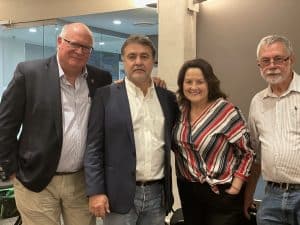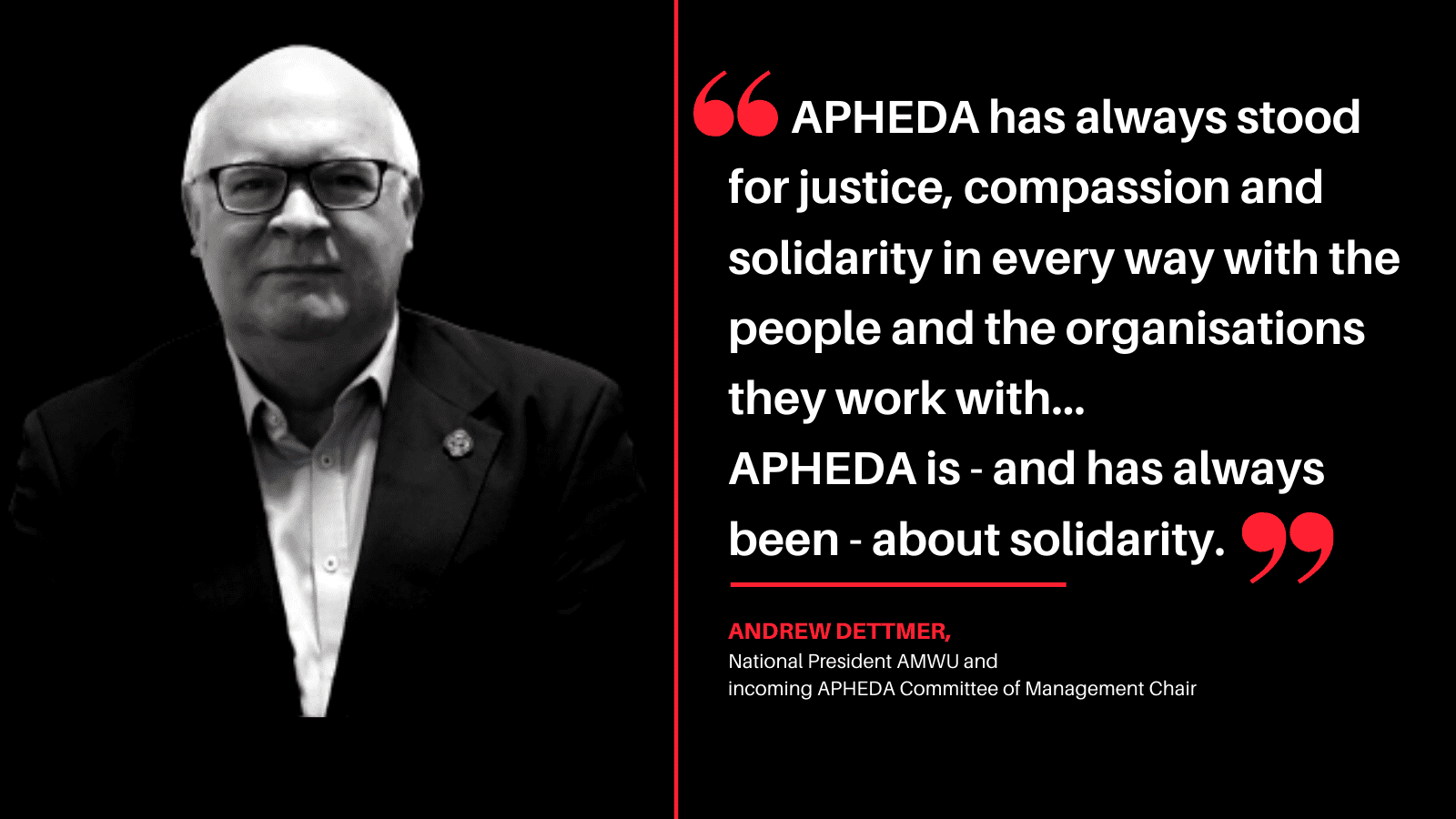APHEDA People: Meet Andrew Dettmer (AMWU)
Union Aid Abroad-APHEDA is about people – people working together to make things better for all. As the global justice organisation of the Australian union movement, each and every APHEDA supporter, member, partner, activist and participant here in Australia and all around the world contributes to the work it takes to tackle inequality and injustice.
This month we speak to Andrew Dettmer, incoming Chair of the APHEDA Committee of Management and National President of the Australian Manufacturing Workers Union (AMWU). Andrew has been a member of APHEDA since 1985. Andrew reflects up 36 years of being an APHEDA member and how important the role of internationalism is within the Australian union movement. Meet Andrew!

From left: Andrew Dettmer, Angelo Gavrielatos (outgoing APHEDA Chair), Kate Lee (APHEDA Executive Officer), Peter Jennings (former APHEDA Executive Officer)
What’s your view about the role of internationalism within the Australian union movement?
The Australian trade union movement has a lengthy and proud record – from supporting the London Dock strike in 1889, to defending Indonesian independence in 1945 and opposing Australia’s involvement in the Vietnam War in the 1960s. The Australia trade union movement has always been progressive and has always stood up for worker’s rights when they have been under attack. These are the good things that we don’t often reflect upon. Now, through APHEDA, the Australian trade union movement can continue to do global justice and internationalism the trade union way. Not a member yet? Join today!
We are currently living through a once-in-a-century pandemic and the economic, health and social shocks are deep and will last for many years to come. What do you think is important for unions and others to consider while working for equity and justice?
Nobody predicted a pandemic. Nobody predicted that we would have the level of dislocation that we are experiencing. But what APHEDA is doing and what unions are doing is taking the fight up for the global community at large. We are saying that vaccinations and other health measures should be applied universally without discrimination. That barriers to access the COVID vaccine should be removed (see our current petition!). We also want to see workplaces have the protections and various other means in place to ensure that the health and safety of workers isn’t negatively impacted by the pandemic. The economic impacts are profound. We know about the health impacts – they are visible. But the economic impacts run deep. Firstly what we have seen is an incapacity of the state to respond in a timely fashion. This was exemplified by the Trump administration. In Australia a lot of our manufacturing has been destroyed in the last 30 years, and we couldn’t make the protective equipment needed to respond. COVID-19 has shown that thirty years of Free Trade Agreements hasn’t done anything for our manufacturing capacity. With APHEDA, we need to continue to put people first. To consider peoples’ health first and foremost. Part of that comes through APHEDA’s capacity to assist our partner organisations in the way they approach the health of their members and their communities at large and to ensure that COVID does not impact on trade union and worker’s rights. APHEDA has called out those governments which have used the cover of the pandemic to push through appalling policies. From Duterte in the Philippines to Hun Sen in Cambodia and now we see it unfold in Myanmar. The generals have overthrown the good work that has been done to turn Myanmar into a democratic state and set the country back decades. Through APHEDA, we can provide assistance and raise awareness within Australia and the developed world. We can highlight the nature of not only the struggles of people in countries that we have projects in, but also campaign around injustices that have been perpetrated by governments, to ensure that workers’ rights remain strong.
You’ve been an APHEDA member since 1985, recruited by co-founder and the then retired ACTU President, Cliff Dolan. What stands out for you about APHEDAs work and contribution over the decades?
APHEDA has always stood for justice, compassion and solidarity in every way with the people and the organisations that we work with. Over the years we have been able to develop great relationships with colleagues in countries like Palestine, Vietnam, Cambodia, and South Africa. That to me has always stuck out – it has always been about relationships and treating people with respect and dignity. That idea of just giving to charity has never washed with APHEDA and has never been a motivating factor. APHEDA is and has always been about solidarity.
The long-term impact of the work that APHEDA has done has been at times enhanced, and other times diminished, by government decision making. I would have hoped that the work APHEDA does would be beyond petty politics; the work has at its heart the ability to lift people up. What I have noticed though is that recently, aid and development work has become significantly politicised. For instance, the way that our DFAT-funded project was subject to public attack in 2018 by ill-informed people with an axe to grind has been profoundly disappointing. These are projects that connect small-scale Palestinian farmers to markets to improve their livelihoods. These are projects that generated new employment opportunities for women and girls in West Bank and Gaza. We know how important this agricultural development work is to people in Palestine and the Occupied Territories. We have seen the successes and have been part of this program and other linked work for more than 25 years. In the 36 years I have been a member of APHEDA, I have never seen such attacks based on falsehoods on what should be a project which Australia – all of Australia – should be incredibly proud of.

With so many challenges globally, what does the future hold for APHEDA, its members and the broader union movement. What do you think is important in how we respond?
All these challenges will mean a lot of hard work for APHEDA. I think we have to engage our critics – where they are capable of rational thought… We will have to reach out to as many unions as possible and the affiliates and peak councils. We will have to broaden our message to reach our community at large and working people in general when we talk about the work that APHEDA does. If we are going to attract assistance from government and from NGOs and global union partners, at the same time we need to develop and get greater support from the Australian labour movement. Then we have to show our broad appeal and highlight the successes we have had. This is work we are proud of and that has been developed over decades. This work can only occur and can only occur effectively if the Australian working class can see the importance of these programs. I would hope that the board, affiliated unions, the ACTU and our very many members and activists, and of course our staff, need to be telling people how we are responding and developing new ways of thinking and new approaches to capacity building in countries in our region and the partner organisations that we work with. We also need to broaden our message to the community that this is about workers being empowered. It is beyond politics.